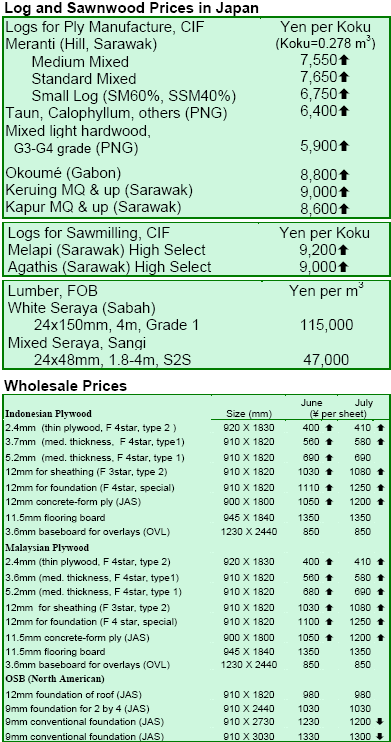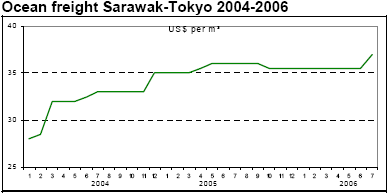|
Japan
Wood Products Prices
Dollar
Exchange Rates of 15th Aug. 2006
Japan
Yen 115.99
Reports
From Japan
Improved weather brings no respite to log supply
In Southeast Asian timber producing regions such as Sabah and Sarawak, the weather has improved, leading to
a gradual availability of logs in the market. However, since local manufacturers of plywood were aggressively
building inventories of logs, market prices were still
rising. According to some traders, it was still unpredictable when domestic prices would hit the ceiling.
Total supply of Southeast Asian logs for Japan fell 23.4% to 521,000 m3 during January-May 2006. Log inventories
also declined 27% to 263,400 m3 at the end of May, equivalent to 2.5 months of supply.
Rising plywood prices push building costs up
As plywood prices continue to edge up, prices of all building materials are rising in Japan. In June, some
major companies of building materials printed new catalogs and disseminated them to customers. Prices for
flooring materials which use plywood as flooring base have increased by 20%.
Housing starts hit fifth consecutive monthly rise
Housing starts reached 114,331 units in June, up 4.7% from June last year and marked the fifth consecutive
monthly gain. Total housing starts during January-June 2006 rose 6.8% to 618,455 units over the corresponding
period in 2005. Seasonally adjusted annual housing starts stood at 1,282,000 units. Wood based units expanded to
51,301, up 5.7% from June last year, due to an increase in owner-occupied units. Wooden units accounted for
44.9% of the total housing starts in June, up 0.8 points from the previous month. The general recovery of the
economy and improved corporate performance continued to encourage construction activity in the country.
Japan chalks up first land prices rise in 14 years
Japanese land prices rose for the first time in 14 years in 2005, signalling an end to the persistent asset deflation
that had dragged the nation’s economy into recession in the early 1990s. According to the National Tax Agency,
price gains were spread across Tokyo, Chiba, Aichi, Kyoto and Osaka. In 2004, Tokyo had been the only
prefecture in which land prices rose.
Nationwide land prices increased an average 0.9% last year, compared with a 3.4% fall in 2004. In Tokyo,
average land prices rose 5.4%, compared with a 0.4% rise in 2004. According to some real state analysts, even
larger increases may be seen in 2006 as there have been significant price rises in Tokyo in the past six months.
The average value of Japanese residential land had fallen 33% in the 15 years to March 2005, while in the six big
cities (including Tokyo), the fall averaged 65%, with commercial land prices slumping 87%.


|